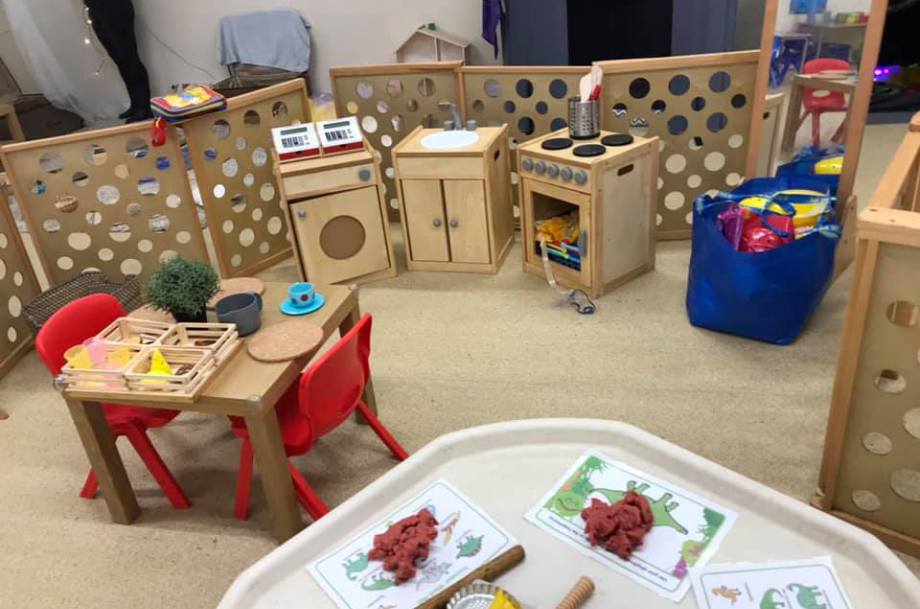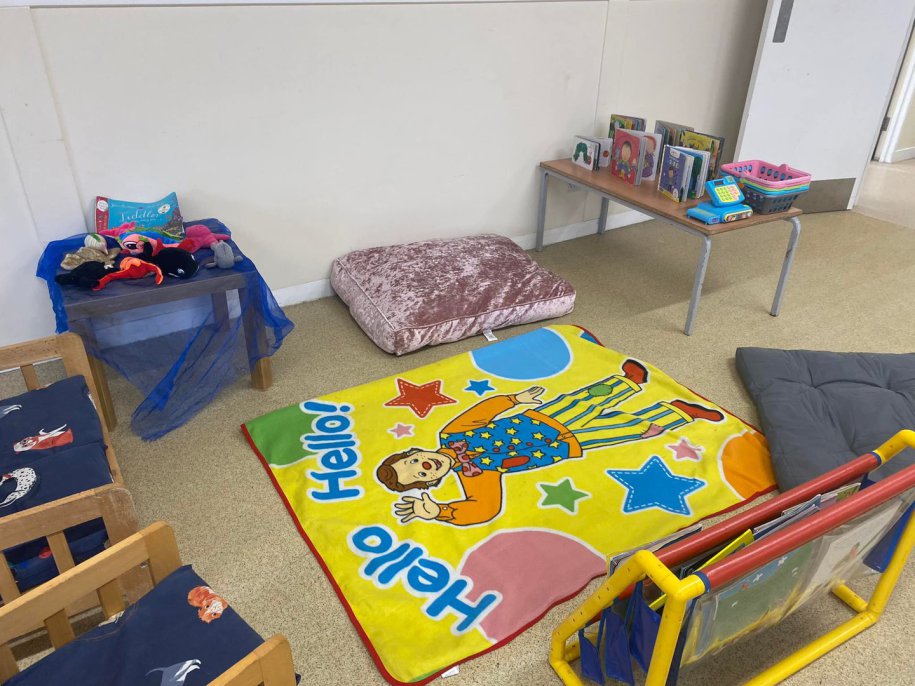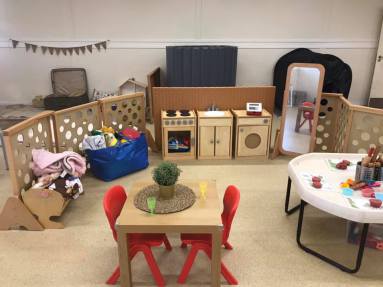Setting Provision
Runnymede Pre-school provides sessional, term time provision, 9am - 3.00pm Monday to Friday; for children aged from 2-5 years, our setting operates an open
door policy where parents/carers are free to visit and speak with our Managers, our SENCO- Sarah Debenham, key persons and practitioners. For further information or to discuss any queries/concerns
please contact our Mangers/SENCO on the above contact details. All of our setting's policies including our complaints policy can be found on this website or a paper copy is available in our
setting.
Accessibility and Inclusion
Our setting is located on the ground floor of Runnymede Hall, the building is wheelchair accessible and all on the one level, large parking spaces are available and
situated nearby in the adjacent car park. Toileting facilities are wheelchair accessible and we have nappy changing resources/area for those children who require it.
We provide visual resources in our key areas by the means of labels, pictures and photographs. Our practitioners adapt the visual environment to meet the needs of their key child.
Pre-school newsletters, information regarding application for a place can be provided in languages other than English and we have one practitioner who has received Makaton training. Our policies and
procedures can be made available in large print as well as additional languages. Talking point aids have been used to assist children with their communication to help promote understanding of our
environment and resources.
Our setting SENCO is sensitive and approachable when discussing requirements to meet a child’s additional needs, working closely with our Managers, SENCO support, area SENCO, practitioners, outside
agencies, parent/carers and children ensuring that the child and their parents/carers needs are fully met (Area SENCO offers valuable help, support and advice).
We have a parent/carer notice board displayed within the Pre-school foyer and in our small hall where the children are collected to ensure all relevant information is easily available, which can also
be found on our website and Facebook page.
Our practitioners plan daily to enhance our provision/resources so that the environment may be adapted indoors and outdoors to provide play to suit each child's needs. We make every effort to ensure
our environment is fully inclusive.
Transitions
Before the child starts our Pre-school parent/carers are made aware of our open door policy and are invited to visit with their child on as many occasions as possible,
this enables the practioners, Managers, SENCO to gather and record all information, such as, needs, likes, dislikes for both the child and their parent/carer. This settling in period ensures the
setting is able to meet the needs of the child in a caring, safe and suitable environment. One Plans can be devised if appropriate.
When preparing the child to move onto primary school, if appropriate, a one planning meeting with the family and all professionals involved is arranged with the SENCO, key person, parent/carer and
relevant outside agencies involved with the child to ensure the transition to their new school runs smoothly. The school teacher is invited into our setting so that a good relationship can be
developed between the child and their new key person also with parent/carer permission our learning and development knowledge of their child will be shared to ensure the next steps for the child are
in place before they start.
Specialist staff Qualifications
Sarah Debenham - Designated SENCO & Deputy Manager
Catherine Vickers - SENCO support, Safeguarding support and Manager
We ensure our knowledge is up to date with legislation, guidance and know how.
Identification and Early intervention
Our parent/carers are regularly kept up to date with their child's progress in all areas of their development and learning. The child's 'Learning Journey' begins even
before their first day at Pre-school, with our 'Starting Point Profile' completed in partnership with the parent/carer and key person on one of the many visits you and your child will have the
opportunity of. At these visits there will be discussions with your child's key person, SENCO and Managers regarding meeting your child's individual needs. The visits also allows your child to become
familiar with the routine, environment, practioners and bond with their chosen key person. The 'Tapestry online learning journal' provides a timeline of development by the means of observations,
photographs and regular assessment of the child's next steps. This is an important resource for the key person, SENCO and Managers to ensure the setting provides planning to meet each child's
individual needs, and if your child is not meeting their developmental milestones and/or the amount of support needs to be changed, these processes will ensure early identification and intervention.
This is also a valuable line of communication between home and our Pre-school, especially if parents/carers are unable to regularly visit or collect their child from the setting. The Learning
Journey's assessments are completed using the EYFS (Early Years Foundation Stage) Development Matters guidelines. The regular assessments will identify early intervention and children who are not
meeting their developmental milestones and strategies to support the child will be Assessed-Planned-Actioned-Regularly Reviewed, ensuring that parent/carers are able to support their child's progress
at home working in partnership with our setting. Parent/carers are equally involved in creating their child's Tapestry journal by adding observations and photographs etc., so the key person is made
aware of the child's likes/dislikes and achievements at home. Our policy is for our Pre-school and parent/carers to work in partnership, this helps us to achieve a strong, trusting relationship
between our setting, the child and their family.
We hold supervision meetings which is one of our opportunities for Managers and key persons to discuss concerns/progress of children's development, staff meetings and our morning start up chats
ensure all staff are aware of each child's individual requirements. If the parent/carer has concerns or worries regarding SEN, our setting will arrange a meeting to discuss the way forward. We then
follow a graduated response system in accordance with our SEN policy;
SENCO supports staff in using observations to identify your child's strengths and interests and develop next steps to enhance their learning development.
The child's progress will then be monitored and reviewed regularly.
If a child requires additional support in any areas of their development, with the parent/carer's permission a targeted learning plans put in place, recording short targets for the child.
Planning the environment and resources will then be differentiated so that we can meet the child's individual needs.
Parental consent will also be sought to submit a 'Request for Guidance' from the local SEN inclusion Teacher.
We work in co-production with parent/carer's of children with Special Educational Needs so that we can create and maintain a positive partnership and an enabling
environment, ensuring parent/carer's are informed at all stages of assessment, planning and provision reviewing their child's progress.
Our SENCO ensures regular meetings with all practioners E.g. Health Visitor, Speech/Language Therapist etc. concerned in your child's care, this is to ensure the child's needs are agreed, addressed
and targets are met by everyone concerned in caring for your child. Parent/carer's concerns, opinions and agreement are sort every step of the way before we implement planning requirements in our
setting.
Point of contact for additional information - Sarah Debenham our SENCO or your appointed Key Person.
Further advice and support can be found from our local Children's Centres, who if required offer workshops at our setting.
Nearest Children's Centres to our Pre-school:
Little Handprints, situated in the grounds of Thundersley Primary School, Dark Lane, SS7 3PT, tel no 01268 753557



